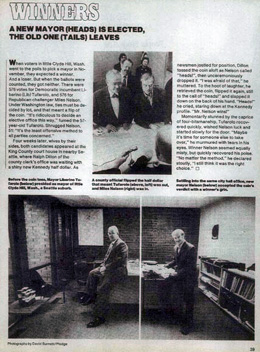On December 1, 1975, Miles Nelson defeats Liberino ("Lib") Tufarolo in a coin toss to determine the winner of Clyde Hill's mayoral election. The election a few weeks earlier ended in a 576-576 tie, and pursuant to Washington law and custom, the winner is decided by the flip of a coin. Though this procedure isn't unheard for deciding a tied municipal election in Washington and in many other states, the story captures the nation's imagination. It's carried in newspapers across the country and appears on NBC News and in People magazine.
Just Another Election
It was just another mayoral election in Clyde Hill -- a small community on the east side of Lake Washington -- on November 4, 1975. The incumbent, Liberino Tufarolo, was long established in local politics. He was first elected to Clyde Hill's town council in March 1960 and assumed the mayor's post in July 1970 upon the mid-term departure of Lloyd Chapman. He ran unopposed in the 1971 mayoral election, but he had competition in the 1975 election from Miles Nelson, who had been a Clyde Hill councilman for four years.
The election didn't attract any particular attention as it approached. Eric Lacitis, a young reporter at The Seattle Times, observed, "The two men never debated. And, it appears, nobody in the 3,200-population town cared much if they did. No organizations asked the two men to debate before them" ("Mayor's Race…"). Tufarolo spent nothing on campaigning, while Nelson spent $5 on brochures -- and that was only in response to an editorial in the Bellevue American that endorsed Tufarolo. "It made me go out and work," explained Nelson ("Coin Toss…").
Maybe it made a difference. As election results began coming in Nelson took the lead; indeed, The Seattle Times prematurely declared him the winner the next day when the unofficial count showed him leading 463-425. But the paper failed to take into account 91 absentee ballots that remained to be counted. Nelson's lead shrank as they were counted and two days later, on November 7, he led by only one vote, 564-563. Three days after that, Tufarolo had a two-vote advantage. When the final tally was announced on November 19, Tufarolo had edged Nelson out by one vote, 576-575. However, recounts are mandatory in Washington state elections when the difference between the candidates is within one-half of 1 percent of the total vote cast, and when the recount results were announced the following week, the vote was tied 576-576. Washington state law requires tied races to be decided "by lot," which traditionally has been a coin toss. The ceremonial toss was duly scheduled for the following Monday, December 1, in the office of Ralph Dillon, King County Superintendent of Elections.
"They Didn't Vote Intelligently"
In his article, Lacitis asked why there was a tie in the election. "The people didn't know there was a choice. They didn't vote intelligently," answered Nelson. Tufarolo was more circumspect, remarking, "I attribute it mostly to my position on the ballot" ("Mayor's Race…") since his name was printed below Nelson's. He wasn't happy about a coin toss: "It's just ridiculous. I don't think that's how the people would want it done." (He would have preferred another vote.) Nelson was more accommodating, saying, "Oh, well, I guess it's the most equitable, least offensive method of settling it" ("Mayor's Race…").
This was hardly the first municipal election in the country to be decided by a coin toss (many states still do it), but this one captured the nation's imagination. Articles about the forthcoming flip appeared in papers as far away as Lewiston, Maine, and Pottstown, Pennsylvania. Some of the major news outlets covered it too, and the press was duly on hand when the two men met in Dillon's office at the County Administration Building in Seattle at 10 a.m. on December 1 for the big toss-up. Tufarolo again complained that it was a ridiculous way to settle an election. Nelson almost didn't arrive in time, which would have been a shame, because he got the honor of making the call.
Heads It Is!
"Heads," he called, as Dillon flipped a Kennedy half-dollar… and dropped it. The crowd laughed. Dillon muttered "I was afraid of that" ("A New Mayor…"). He picked up the coin, flipped it again, and again Nelson called heads. This time Dillon caught it. He eyed the coin and called out "Heads! Mr. Nelson wins!" ("A New Mayor…"). A stunned Tufarolo wished Nelson luck and left with tears in his eyes, quietly commenting that maybe it was time for someone else to take over. Nelson was more effusive. He explained that he'd been interviewed by a reporter and a photographer from The New York Times, and said during a photo-taking session that he'd practiced tossing a coin. It came up heads six times out of seven, prompting him to call heads when it counted. "I had a feeling I would win," he told the Seattle Post-Intelligencer ("Heads It Is…").
A two-minute piece on the election and the coin toss appeared on NBC News that night, generating calls to the new mayor from people all over the country. A similar article appeared in People magazine the following month. But life in the little community quieted back down soon enough, and both men went their own ways. Tufarolo never served as mayor or councilman again in Clyde Hill, and as it turned out, neither did Nelson. He served one term as mayor and didn't run for re-election when his term ended in 1979.

